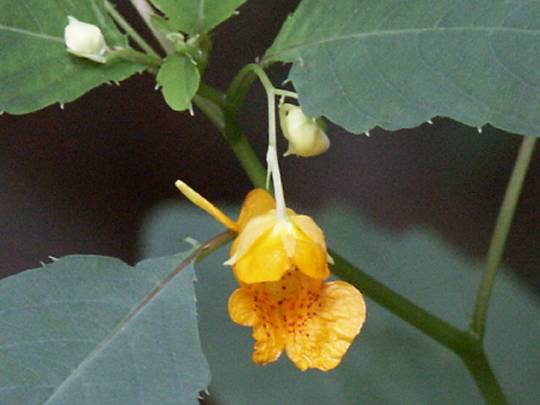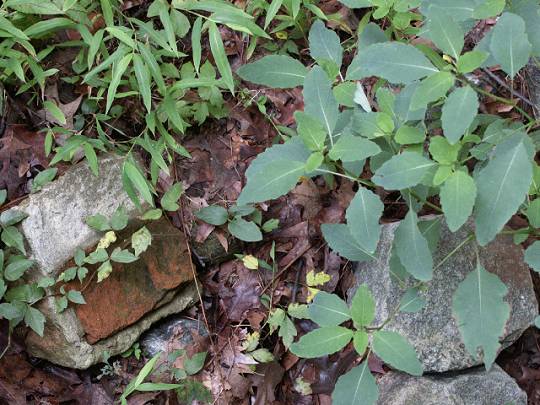
Gardening Snippet #2002-005
Jewelweed (a.k.a. Touch Me Not)
balsaminaceae: impatiens
|
| |
jewelweed foliage:
 |
jewelweed blossom:
 |
| |
poison-ivy foliage:
 |
poison-ivy & jewelweed
side-by-side:
 |
| notes: |
1. Clicking on any image (above) displays larger photos within a new browser window. To continue browsing, close that window. |
2. Photos are courtesy of a
cooperative mother nature, my Minolta DiMage 5 (digital camera), yours truly, and the
Aantares family of online
Communities
. |
While not yet part of our landscape, this plant would make a welcomed addition to the boggy area
which surrounds anyone's pond. Jewelweed often can be found growing in areas where one might also encounter
poison-ivy. And interestingly enough, some species of jewelweed are considered to be a natural remedy for
poison-ivy rashes! In fact; with my being allergic (unlike some people) to poison-ivy, I've used freshly crushed
jewelweed stems & leaves to treat my rashes. I simply picked some jewelweed foliage, rolled/crushed the plant
between the palms of my hands, and then rubbed it onto the poison-ivy infected area (repeating the application whenever
necessary). The poison-ivy rash's incessant itching was immediately relieved, and the unsightly rash (while producing no
more irritation) was dried-up within a couple of days! Others may not experience the same results, as did I, but it's
worth trying (in my opinion).
Jewelweed isn't around all-year-long, although if allowed to seed itself, it will be back next year! And while some say to
boil, or to make an alcohol-tincture of it, I find the following to be a simpler yet effective process: Place some leaves & stems
into a food-processor, along with just a smidgen of water... and then make ice-cubes of the resultant thick-n-sticky concoction.
This process yields an effective (against poison-ivy, at least for me) supply, which one can have on-hand until next year's
supply becomes available!
Jewelweed's blossoms are know to attract the ruby-throated hummingbird. And besides having colorful blossoms, its
foliage is waterproof. Completely submersing it into water makes the greenery turn to a silver-white color, and upon lifting
it from the water again the leaves are completely dry to the touch! These three things make it worthwhile adding to
one's landscape, if but only as a conversation-piece, even if it is not needed to counteract poison-ivy!
Listed below are some links to more specific info about impatiens' related-species.
ars-grin.gov
... search here for the impatiens species' ethnobotanical uses
wellesley.edu
... a brief guide to the impatiens capensis species
botanical.com
... additional info on impatiens aurea, and impatiens biflora
rubythroat.org
... info about jewelweed's attraction of hummingbirds
ibiblio.org
... provides info about poison-ivy/oak/sumac, and also related-info about jewelweed
ncbi.nlm.nih.gov
... speaks to the dubious benefits of impatiens biflora as a treatment for poison-ivy
-- Karl
More Gardening Snippets
top of page
(NOTE: This "Gardening Snippet #2002-001" article and its associated images
are the copyrighted intellectual property of the author, and are being used here with the express
permission thereof. All rights are reserved by the author, who can be contacted at
.
|
|
|
|